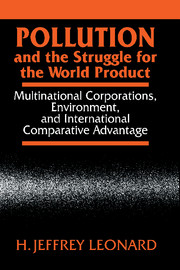 Pollution and the Struggle for the World Product
Pollution and the Struggle for the World Product Published online by Cambridge University Press: 05 January 2012
The costs and logistics of complying with environmental regulations are not a decisive factor in most industrial decisions about desirable plant locations or in the international competitive picture of most major industries. Industrial flight from regulations has not become a significant enough phenomenon to diminish the comparative advantage of the advanced industrial powers. There is no evidence that pollution havens are enhancing their comparative advantage in industrial production by luring whole industries away from the United States and other countries with strict environmental standards. Nor is there any reason to believe that the major trend in international industrial comparative advantage – the gradual shift of many heavy industries such as steel from the most industrialized to rapidly industrializing countries – is being significantly heightened by stringent environmental regulations in the most advanced countries.
Such conclusions do not necessarily prove that environmental factors never influence international industrial-siting decisions or the evolution of comparative advantage in certain industries. They do indicate that the differentials in the costs of complying with environmental regulations and in the levels of environmental concern in industrialized and industrializing countries have not been strong enough to offset larger political and economic forces shaping aggregate international comparative advantage. An interesting and important question is whether in “normal” times, if political and economic turmoil and barriers to trade were lessened, pollution-control expenses and other environmental factors would become more important in the choices made by countries about industrial specialization and the choices made by corporations about location.
To save this book to your Kindle, first ensure [email protected] is added to your Approved Personal Document E-mail List under your Personal Document Settings on the Manage Your Content and Devices page of your Amazon account. Then enter the ‘name’ part of your Kindle email address below. Find out more about saving to your Kindle.
Note you can select to save to either the @free.kindle.com or @kindle.com variations. ‘@free.kindle.com’ emails are free but can only be saved to your device when it is connected to wi-fi. ‘@kindle.com’ emails can be delivered even when you are not connected to wi-fi, but note that service fees apply.
Find out more about the Kindle Personal Document Service.
To save content items to your account, please confirm that you agree to abide by our usage policies. If this is the first time you use this feature, you will be asked to authorise Cambridge Core to connect with your account. Find out more about saving content to Dropbox.
To save content items to your account, please confirm that you agree to abide by our usage policies. If this is the first time you use this feature, you will be asked to authorise Cambridge Core to connect with your account. Find out more about saving content to Google Drive.